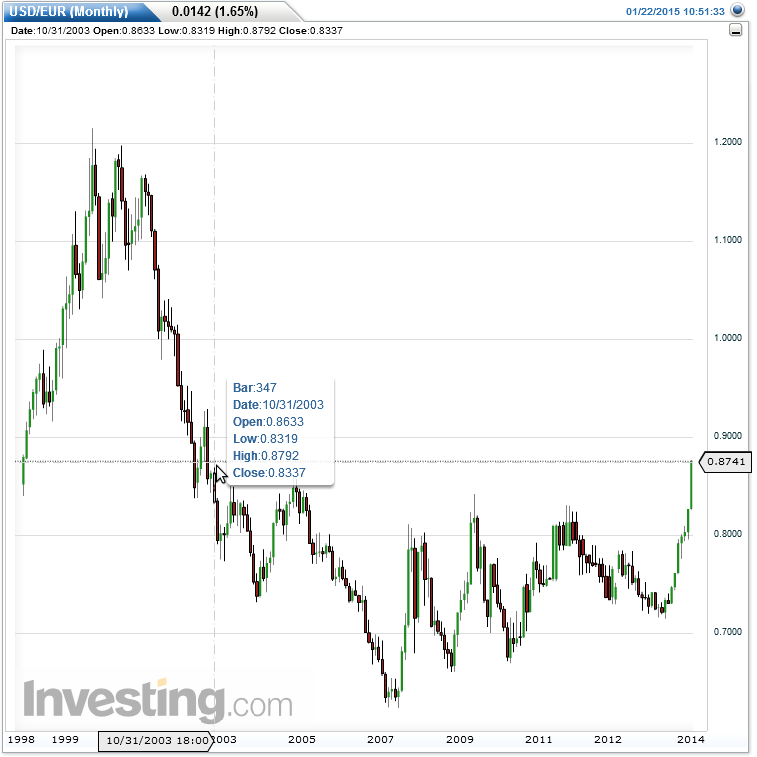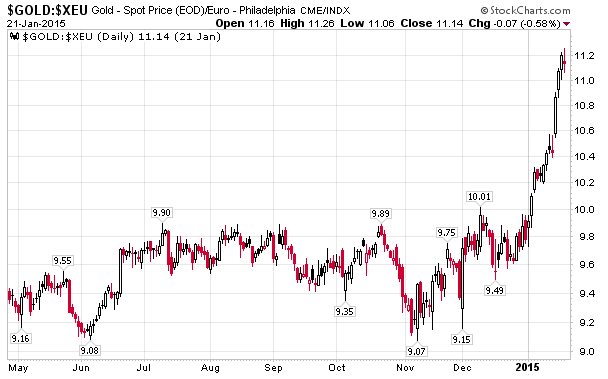"QE Already Working" Says IMF Lagarde; Ho-Hum Details Announced; Gold The Place To Be
Today, ECB president Mario Draghi announced his much awaited QE program that will allegedly save Europe from the imaginary perils of price deflation. See Deflation Bonanza! (And the Fool's Mission to Stop It).
Stocks are up a bit, the dollar is up a bit, the yen is up a bit, and gold is up a bit. Oil is down a bit. The details are more or less along the lines most thought, not the celestial "big bang" that everyone hoped.
ECB QE Press Release
Here are a few snips from the ECB Press Release on Asset Purchases.
The programme will encompass the asset-backed securities purchase programme (ABSPP) and the covered bond purchase programme (CBPP3), which were both launched late last year. Combined monthly purchases will amount to €60 billion. They are intended to be carried out until at least September 2016 and in any case until the Governing Council sees a sustained adjustment in the path of inflation that is consistent with its aim of achieving inflation rates below, but close to, 2% over the medium term.
- ECB expands purchases to include bonds issued by euro area central governments, agencies and European institutions
- Combined monthly asset purchases to amount to €60 billion
- Purchases intended to be carried out until at least September 2016
- Programme designed to fulfil price stability mandate
The ECB will buy bonds issued by euro area central governments, agencies and European institutions in the secondary market against central bank money, which the institutions that sold the securities can use to buy other assets and extend credit to the real economy. In both cases, this contributes to an easing of financial conditions.
With regard to the sharing of hypothetical losses, the Governing Council decided that purchases of securities of European institutions (which will be 12% of the additional asset purchases, and which will be purchased by NCBs) will be subject to loss sharing. The rest of the NCBs’ additional asset purchases will not be subject to loss sharing. The ECB will hold 8% of the additional asset purchases. This implies that 20% of the additional asset purchases will be subject to a regime of risk sharing.
Six Elements of Decision
Digging a little deeper, here are Six Key Elements of ECB Decision.
- Starting in March the ECB will buy 60 bln euros a month in national bonds and agency bonds. The amounts will be driven by the “capital key” which corresponds roughly to the size of the economies. That means that Germany, France and Italy will be the largest buyers.
- The risk will remain largely with the national central banks, but the risk of agency purchases will be shared collectively. Agency bonds will amount to 12% of the assets being purchased. The ECB argues that by controlling all the design features and coordinating the purchases, it has “safeguarded the singleness of the Eurosystems’s monetary policy. “ Market participants may disagree.
- The program will run through September 2016, but ECB clearly keeps door open: the purchases “will in any case be conducted until we see a sustained adjustment in the path of inflation.”
- The asset purchased will be investment grade, but “some additional eligibility criteria will be applied in the case of countries under an EU/IMF adjustment program. This is subtle but important. As long as Greece, Cyprus and Portugal are on some program their bonds can be bought. This is also a subtle indication that the old Troika no longer exists. This is part of the signal from the European Court of Justice preliminary ruling and also the signals from the new EC.
- Although the ECB did not cut its official rates, it did remove the 10 bp premium over the main repo rate (MRO) for the new TLTRO facility.
- There is an issuer limit of 33%. This is why Draghi has indicated that Greek bonds could be bought after SMP redemption, which means after July.
The above courtesy of Marc Chandler of Marc to Market via TalkMarkets.
Any Surprises?
Given that most believed an open ended program is coming, that announcement was hardly earth-shattering.
Nonetheless the ECB is playing with fire. Instead of taking all the risk or making each national central bank take all the risk, it incorporated "risk sharing". And it's pretty clear the ECB took most of the risk.
Expect challenges from Germany.
Reactions
Global market reactions are pretty moot so far. The biggest move is in the currencies. The Euro dropped to a new low vs. the US dollar and the Swiss franc.
US Dollar vs. Euro

The US dollar is back to a level last seen in October of 2003. Parity was last seen in November 2002.
"QE already Working"
Just ahead of the announcement IMF director Christine Lagarde said on a panel at Davos, QE Already Working.
"To a point you can say that it has already worked," Lagarde said on a panel in Davos. "If you look at currency variation and where the euro is at the moment, you can't deny that there is expectations there that QE is about to come and is announced and will be significant."
Apparently Lagarde thinks trashing a currency means the move is working. Hmm. How long ago was it that Lagarde and various monetarists thought the key to saving the world was forcing the US dollar lower.
Here's the other side of the story. Consumers in the eurozone will see prices rise. US exports to Europe will decline.
More importantly, if this is another one of those "whatever it takes moments" where do you want to be? The inflated stock market? Bonds with negative yield? How about gold?
Gold in Euros

The above chart is yesterday's gold close divided by the current movement in euros. Roughly multiply the right scale by 100 to get gold price in euros.
In November something changed big time. I suggest belief in central banks is fading. Gold in all currencies has been rising. Today gold is up again even though the dollar is up significantly.
And in euros, gold is up roughly 22.8% from the November low.
Where Do You Want To Be?
So where do you want to be if the ECB continues QE indefinitely until it reaches its inflation target of 2%. Bonds yielding 0% or even negative percent?
If you look under the covers you will discover Central Banks are as Impotent as Obama. Gold is the place to be.
Disclaimer: The content on this site is provided as general information only and should not be taken as investment advice. All site content, including ...
more


